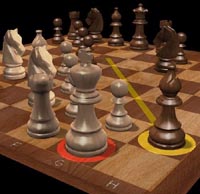Invincible machines slap mankind in the face
Deep Fritz, a multi-processor version of the computer chess engine Fritz, beat World Champion Vladimir Kramnik on December 12, 2006. The final match score: Kramnik 2 – Deep Fritz 4. Kramnik got $500,000, half of the prize money, for his participation in the match. Many chess experts believe the latest match may mark the end of a competition era between man and machine in chess.

“The computers became so smart, and they’re going to be much smarter soon. The computers are going to kill off human chess. They may have killed it already,” sighed Mikhail Donskoi, co-writer of the Soviet chess program Caissa, which won the first world chess championship among computers, held in Stockholm in 1974.
Caissa, named after a patron goddess of chess, was created in the Institute of Management Studies under the USSR Academy of Sciences. According to Donskoi, scientists first showed interest in the chess possibilities of computers in the mid-1960s. A chess engine written by Soviet programmers competed against the U.S. chess engine Chess-4 in 1967. Despite a widely predicted victory of the American chess engine, the Soviet one scored a success that many experts dubbed “sensational.”
The success of the programmers seemed to impress the Soviet government, which allocated funds for the Donskoi team in a five-year economic plan for 1976-1980. Meanwhile, the funding of U.S.-based computer chess engine developers increased tenfold. But the capacity of the early versions of chess engines was rather limited. Grandmasters played a series of matches against the “artificial intelligence” in the mid-1980s. Humans won hands down. World Champion Garry Kasparov gained an unconditional victory playing a simultaneous match against 15 computers late 1980s. Back then, most experts were quite skeptical about the chances of chess software to beat the human race in the foreseeable future.
The alarm sounded for first time after Kasparov lost a blitz match to a chess machine in 1992. Kasparov lost another match to a multi-processor chess monster Deep Blue five years later. Deep Blue weighed 1.5 tons. It was capable of calculating game moves 200 million times faster than the human brain. The match ended in a 3.5-2.5 win for the technological miracle built by IBM Corporation.
Man has not won any multi-game match against the machine since 1997. Vladimir Kramnik played an eight game match against a version of Deep Fritz running on a Compaq 8-processor machine in the Brains in Bahrain in October 2002. The match ended tied 4-4, with two wins for each participant and four draws.
The match played by Kasparov against a version of Deep Junior ended tied 3-3. The rest of the world’s leading grandmasters (Nigel Short, Ruslan Ponomarev, Michael Adams et al.) lost their matches against the machines. The balance of power has already tipped up or so it seems. Kramnik is often referred to as the last man standing in the battle against the machines capable of making far-sighted plans some 20-40 moves ahead.
“We shouldn’t be overly dramatizing at this point. As far as I’m concerned, I don’t like when some people call the matches lost to the machine a ‘smack on the face of the human race.’ I don’t like when the computer is called a ‘silicon monster’ either. The computer is one of the achievements of human civilization,” said Mikhail Donskoi. “Kramnik wasn’t battling a piece of iron. Actually, a great deal of intelligence has been ‘crammed’ into a chess engine.
It greatly exceeds the abilities of such outstanding players as Kasparov or Kramnik. You know, Academician Korolyev couldn’t have sent Gagarin to space single-handed. I believe we should be really proud of the success scored by the machine in a chess battle against man. We shouldn’t be afraid of it,” added Donskoi.
Izvestia Nauki
Translated by Guerman Grachev
Pravda.ru
Subscribe to Pravda.Ru Telegram channel, Facebook, RSS!





